
"An amateur film made by and starring the husband and wife duo, John & Evelyn Kibar. After Mrs. Kibar asks Mr. Kibar to throw away his old collectables, or “junk,” Mr. Kibar begins reflecting on past travels. Only later do we find out this travel sequence is actually just a dream." Chicago Film Archives
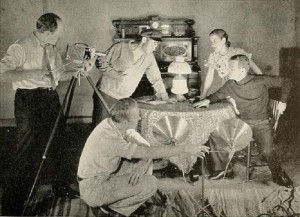
"Not One Word, by Kenneth F. Space, ACL, is an all around triumph of amateur photoplay production. It is a simple melodrama of the keeper of a lighthouse, his wife and the rejected suitor who returns. A wreck at sea (beautifully staged in miniature) is the complicating dramatic factor, and, with these ingredients, a dignified motion picture story of remarkable unity has been produced. In it, Mr. Space and his able staff have blended dramatic lighting, authentic settings and superb photography to achieve a distinguished whole. Under restrained but smoothly paced direction, the three leading players have enacted their roles with definite histrionic skill. If one were to try to select a single quality in the film which is outstandingly brilliant, the vote of this observer would be cast for the cutting. It is accurate and incisive, adding that last bit of dramatic "punch" which is perhaps the quality least often achieved by the amateur producer. Not One Word speaks for itself, but in the wordless and potent idiom of cinematic imagination." Movie Makers, Dec. 1934, 534.
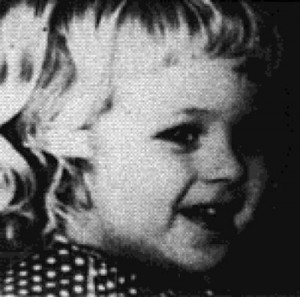
"Once again the Lawlers permit us an intimate glimpse into the lives of their family. Number 10 (boy or girl?) has joined the family and introduces all the brothers and sisters, who, in turn, tell us of their personal doings. The time has come for Number 10 to undergo the ritual of his first haircut. The whole family participates, and each child vividly recalls his or her own experience of the "first haircut." Mother's tears fall as the curls fall, but all is cheerfully forgotten as their beautiful "girl" emerges from the barber's apron a handsome boy. All narration, in each child's voice, is in rhyme, and the charm of the children is heard as well as seen, making this a truly outstanding family film" PSA Journal, Oct. 1963, 40.
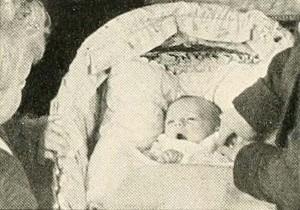
"With Number Three Arrives, John Martin carries on the continuity both of his charming family and of his delightful films of them, so ably introduced by his last year's award winner, A Day with the Young Martins. Here again are the sure feeling for cinematic story technique, the nicely effective angles and the smooth sequencing which belies any need for titles. Added to these deft and familiar abilities of Mr. Martin's work, the current production brings to light a delightful flair for farce comedy by the harassed father and a family terrier rivaling, on a small scale, the best of Hollywood's canine thespians. Once more, Mr. Martin has proved beyond argument that a well planned family film may be of interest to all who see it." Movie Makers, Dec. 1937, 630.
"A fun time is in store for the smartly dressed women disembarking from the bus, in this lovely film from 1929. Joshua Preston, Mayor of Stockport, entertains a group of nurses at Glengarry, his family home, with a garden tour, and games and races, followed by tea on the lawn. With music as well, this makes for a grand afternoon out. The reel ends with the Preston family in the Glengarry garden." (BFI Player)
"Objectif Festival is a story based - on truth or not, we don't know - of an old photographer who decides to bring his camera, tripod and all, the to the Cannes Film Festival to get a few still shots. He is not prepared for the fast shooting shutterbugs of today, nor the Bikini clad French dolls that litter the beaches. Time has passed him by in more ways than one. The film has been cleverly cut to fit its musical score, and this unusual editing has earned for the film the MPD Golden Scissors Award for the best film editing in the contest" PSA Journal, Sept. 1964, 50-51.
"Black and white film documenting the life experiences of Lorena E. Washburn in Manti, Utah. Film highlights Lorena's years of service to her community, Church, and family." Church History Library.
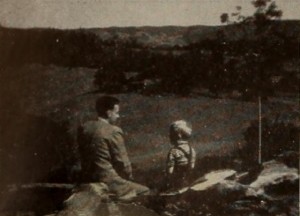
"Five years before the action of The Old House opens, a young man and his bride of but a year had been involved in a train wreck. The bride, Claire, was killed: but the man — scarred in mind, bruised in body and (he thought) dependent on a walking stick — lived on. He comes now, as the film begins, for one last look at the Old House, "the Old House where I was born and grew up, where Claire and I had been so happy for one short year, with hopes and plans for a future that never came." But, instead of viewing (with self-inflicted sadness) his old homestead, he meets accidentally with a brightfaced boy of five, son of his widowed tenant. How this youngster, this "artless wisdom dressed in blue jeans," frees the man from his stick (a mere surface symbol of his bondage) and from his obsession with the past is the theme of The Old House. But it is fruitless always to attempt a factual outline of any visual study in human relations. And, heartwarmingly, believably and triumphantly, The Old House is simply and exactly that. The producer, Keith Hall, has plotted the course of his tenuous drama with a sure touch and unfailing taste. His scenic progressions are so artful as to seem artless, while his camera work and narrative exposition never fail him in the delicate unfolding of his denouement. Yet it is to the three players of this picture — and to their narrator — that the ultimate tributes must be paid. Young Ross Hall as the Boy, Noela Hall as his widowed Mother, and Mr. Hall himself as the Man are exactly and exquisitely right in their restrained underplaying of three diflicult roles. Reg Cameron, the narrator, speaks lines which are always literate, and often lyric, with warmth and understanding. From its simple opening to its quietly soaring climax, The Old House is a tender and moving triumph." Movie Makers, Dec. 1953, 318-319.
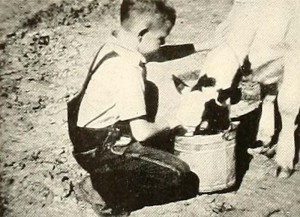
"On the Farm, made by Mr. and Mrs. Ray Garner for the Harmon Foundation, is an example of visual education at its best. By the use of two charming, healthy little American children as the chief characters, it enlists sympathy before it attempts to instruct. And it never strays from the fundamental concept which, to all evidence, was in the minds of its makers: namely that, to teach children by visual aids, one must appeal to their sense of fun. Charm, here, is not outlawed simply because it is not informative. Divided into two parts, Morning and Afternoon, and illustrated with unpretentious titles, such as This is how the animals help, which are chalked in white letters on a blackboard, On the Farm tells of a common workday, in terms of what two farm children can do to assist their parents. From the sequence in which the tousled farm lad puts his head out of the window to see what kind of a daybreak it is. to the time when the sun goes down behind the silo, almost every kind of farm activity is shown. Other children in city classrooms are going to see themselves in the scenes and will want to learn more about a way of life in which they can feel so much at home." Movie Makers, Dec. 1940, 600-601.
"Groups of people assemble in town, meeting and chatting on the street. At the beach, women feed the seagulls, go on a fairground boat ride, and they feed chips to the gulls both on the beach and from a wooden pier, A family assemble in the garden - the girls are wearing school uniform - and sit together. There is a shot of horned cattle in a field, and there is a garden where an old man mows his lawn, while a very old man receives a buttonhole. The location shifts to a clifftop walk. In what seems like an earlier period, very formally dressed people play with a small child, and sit in deckchairs" (NWFA Online Database).
Total Pages: 39